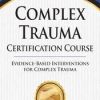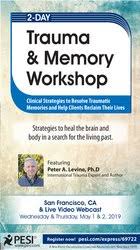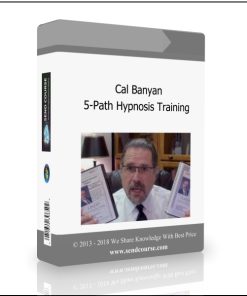2-Day Trauma & Memory Workshop: Clinical Strategies to Resolve Traumatic Memories and Help Clients Reclaim Their Lives – Peter Levine | Available Now !
$439.00 Original price was: $439.00.$149.00Current price is: $149.00.
2-Day Trauma & Memory Workshop: Clinical Strategies to Resolve Traumatic Memories and Help Clients Reclaim Their Lives – Peter Levine | INSTANTLY DOWNLOAD !
Salepage_https://catalog.pesi.com/item/52138/
Archive: https://archive.fo/wip/g65Gd
Addressing traumatic memories directly is critical to successful therapy.
But there’s tremendous misunderstanding in how to work with traumatic memories in treatment. It can leave you confused, insecure, and seeking a deeper understanding of memory systems to help guide your important work.
Peter Levine, PhD is a master therapist, pioneer in the field of trauma and memory, and author of several seminal books on trauma. His body-oriented techniques for healing traumatic memories are built upon 50 years of research and clinical work and have influenced generations of therapists.
This recording is your chance to learn from Dr. Levine himself!
Dr. Levine explains the significance of memory systems in the resolution of trauma, and shares the therapeutic approaches that he’s found most effective during his decades of groundbreaking clinical work. His proven strategies will help you to quickly reduce symptomology in your clients and heal the traumatic memories that haunt them. Under Dr. Levine’s expert guidance you’ll discover how you can take your treatment of complex, deeply entrenched trauma to the next level and overcome the painful roadblocks that can frustrate you and your clients.
You don’t want to miss this rare opportunity to study directly under Dr. Levine and learn from a legend in our field!
- Articulate the four major developmental stages that increase vulnerability to trauma and how to recognize them in your clients.
- Determine the naturalistic mechanics of trauma and survival responses of flight, fight, freeze and collapse as it relates to clinical treatment.
- List the different types of memory systems and comprehend the connection to the mind and body’s way of processing the types of memories.
- Identify the various forms of memory and their impact on working with clients in therapy.
- Explain ways to identify which memory systems are operative and how to access these (memory) components in a systematic fashion to promote self-regulation, integration and empowerment with clients.
- Discover the evolutionary underpinnings of trauma and the Polyvagal theory and their clinical implications.
- Demonstrate the importance of “Bottom-Up” processing versus “Top-Down” processing to improve treatment outcomes.
- Analyze the effects of stress on somatic and emotional syndromes in clients.
- Incorporate Dr. Levine’s simple containment tools to more effectively engage your client in trauma therapy.
- Implement Somatic Experiencing© techniques to help clients heal traumatic memories.
- Demonstrate practical tools for therapeutic work with emotional and procedural (“body”) memories.
- Describe how to avoid the pitfalls of generating spurious (“false”) memories and help clients come to peace with their troubling memories and haunting emotions.
Trauma and the Body
- Developmental trauma
- Pre-natal through age 5
- Evolution and Polyvagal foundation
- How the body stores trauma
- Clinical research
Deeper Understanding of Memory and Clinical Implications
- Explicit – More Conscious Memory
- Declarative
- Episodic
- Implicit – Less Conscious Memory
- Emotional
- Procedural/Body Memory
- Clinical application for memory systems
Traumatic Memories
- Long-term memory vs short-term memory
- How the brain and body store memory
- Memory engrams with somatic markers
- Fight, flight, freeze response
How Clients Get “Stuck”
- Tonic immobility – The fallback to freeze Freeze couples with Fear
- Dissociation
- Bracing and terror
- Euphoric dissociaton
- Collapse
Somatic and Emotional Reactions to Trauma
- Symptoms and complexities of each in therapy
- Emotional – anxiety, depression
- Somatic – chronic pain, fibromyalgia
- Autonomic – migraines, irritable bowel
- Resolving Traumatic Reactions
The Basic Stages of Trauma Treatment
- Containment of strong sensation and emotion
- Pendulation – The dual opposites of sensation
- Titration – going gradually
- Completion
- Renegotiation of active for passive responses
- Allow things to settle: Self-Paced termination
Therapeutic Approaches to Heal Traumatic Memories
- The importance of “Bottom-Up” processing
- The Paul MacLean’s Triune Brain In an Unspoken Voice
- Somatic Experiencing©
- Renegotiation vs. Reliving
- Restoration of self-regulation
- Somatic experience of trauma
- Developing internal awareness
- The mind-body connection in trauma work
- Help reinforce trust and acceptance in clients
- Incorporating client’s spiritualty in trauma work
Tag: 2-Day Trauma & Memory Workshop: Clinical Strategies to Resolve Traumatic Memories and Help Clients Reclaim Their Lives – Peter Levine Review. 2-Day Trauma & Memory Workshop: Clinical Strategies to Resolve Traumatic Memories and Help Clients Reclaim Their Lives – Peter Levine download. 2-Day Trauma & Memory Workshop: Clinical Strategies to Resolve Traumatic Memories and Help Clients Reclaim Their Lives – Peter Levine discount.
1 review for 2-Day Trauma & Memory Workshop: Clinical Strategies to Resolve Traumatic Memories and Help Clients Reclaim Their Lives – Peter Levine | Available Now !
Add a review Cancel reply
Related products
Ecommerce
Ecommerce
Ecommerce
Ecommerce
Ecommerce
NLP & Hypnosis
NLP & Hypnosis












Ethan Tanner –
Thanks | 2-Day Trauma & Memory Workshop: Clinical Strategies to Resolve Traumatic Memories and Help Clients Reclaim Their Lives – Peter Levine